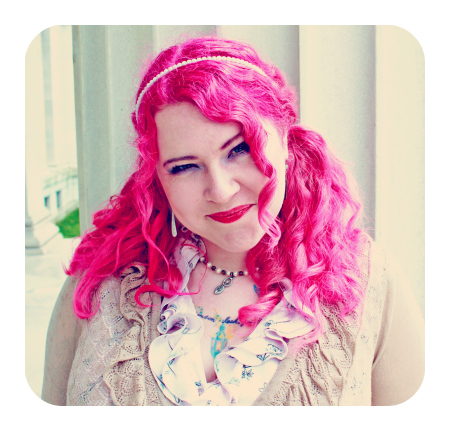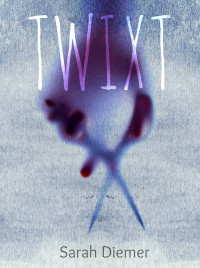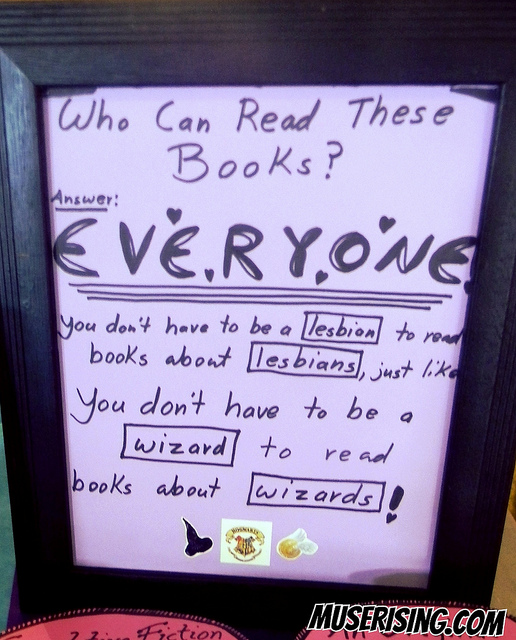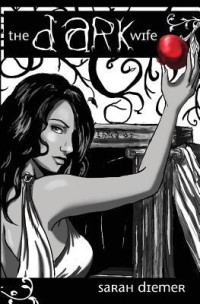Interview with Sarah Diemer
 Since my novel Ash was published, I’ve been on the lookout for more young adult fantasy novels with lesbian heroines, but I’ve found very, very few. One of the few was Sarah Diemer’s self-published 2011 debut, The Dark Wife, which is a YA retelling of the Persephone and Hades myth — with a lesbian twist.
The Dark Wife won the Golden Crown Literary Award for Speculative Fiction in 2012, an award that honors lesbian speculative fiction. Since then, Sarah and her wife, Jenn, launched Project Unicorn: A Lesbian YA Extravaganza, which publishes original YA short stories featuring lesbian heroines. And Diemer released her second novel, Twixt, earlier this year.
Since my novel Ash was published, I’ve been on the lookout for more young adult fantasy novels with lesbian heroines, but I’ve found very, very few. One of the few was Sarah Diemer’s self-published 2011 debut, The Dark Wife, which is a YA retelling of the Persephone and Hades myth — with a lesbian twist.
The Dark Wife won the Golden Crown Literary Award for Speculative Fiction in 2012, an award that honors lesbian speculative fiction. Since then, Sarah and her wife, Jenn, launched Project Unicorn: A Lesbian YA Extravaganza, which publishes original YA short stories featuring lesbian heroines. And Diemer released her second novel, Twixt, earlier this year.
For YA Pride, I invited Sarah to tell me a bit about the work she puts into publishing her books, as well as the challenges she’s faced as a writer of lesbian YA fantasy, and what’s coming next.

Malinda Lo: The more I learn about self-publishing, the more I think it’s just a ton of work. If you could give writers who are interested in self-publishing only one piece of advice, what would it be?
Sarah Diemer: *laughing* IT IS SO MUCH WORK. Very rewarding work, but still—yeah. You are correct. ;D And that would be my one piece of advice, honestly: be prepared to work your butt off. The work’s worth it though, because you believe 100% in your story (and if you don’t, you shouldn’t be self publishing). How your book does is 100% dependent on how fiercely passionate you are about your work and its message. In that regard it’s “easy” for me because I’m a lesbian woman who grew up desperate for lesbian heroines in the stories I loved. You need to be wholly committed to your story in order for it to have any chance in the world.
 ML: You recently released a new YA novel, Twixt. What was your inspiration for this book?
ML: You recently released a new YA novel, Twixt. What was your inspiration for this book?
SD: Several years ago on Christmas Day we were driving the five hours from my parents’ house to my wife’s parents’ house. It was snowy and dark and gray and cold, and I was thinking about death and life, because that’s of course what you do on Christmas Day. We passed over this little bridge, and I saw a hole broken in the ice. I thought about who could have broken that hole, and immediately got the picture of a girl with dripping black hair, sobbing with bloody hands, kneeling by the hole in the ice. The rest of the story unraveled from there. Cheerful! ;D
ML: I saw this great post you wrote on Tumblr that included a photo of a sign you made for a book fair that declared, “You don’t have to be a lesbian to read books about lesbians, just like you don’t have to be a wizard to read about wizards!” That really struck home for me because I feel like I’m always saying that. The most frustrating thing is that I read about straight people all the time even though I’m not straight. How do you deal with this kind of silent homophobia in which people basically look right past your work simply because it’s not about people like them?
SD: The post you’re referring to is one of my more grace-filled moments. I have a lot of graceless ones in this struggle, too—I just don’t talk about them as much. :) It is deeply debilitating to be told after working five years of my life on a novel that I poured my soul into it that a reviewer won’t read it because it has a lesbian main character, or how people wince when I tell them what the book is about (and then tell me, to my face, that they could never read a book with a “person like that” as the lead), or have the book talked about that it’s great but WARNINGS FOREVER IT HAS A LESBIAN MAIN CHARACTER.

I know that a lot of people assume because I’m eternally optimistic that having doors shut in my face and facing homophobia constantly because I dared to be an out lesbian writing out lesbian characters that it doesn’t affect me. But it does. How could it not? Just because I’m deeply passionate about the stories I tell doesn’t mean that being told “no” constantly wouldn’t hurt.
For me, the only two things in the world that get me through the darkest days of self-doubt are my wife and the emails, letters and notes I’ve gotten from my fans. My wife, from the very beginning, has believed in my stories and is utterly unwavering in that, even when I have dark nights of the soul and tell her I’m giving up writing forever to create a pig farm where the pigs are petted every day (GREAT BUSINESS MODEL RIGHT?), and the stories from young women who have decided not to commit suicide because they read one of my stories, or that they decided to become a writer because of something I wrote. It reminds me that the homophobia, the doors being shut…they’re worth it because this helped someone. Basically, that I didn’t write in vain. And that makes it better.
ML: Since my first novel, Ash, came out in 2009, I’ve been waiting for more YA fantasy with lesbian characters to be published — particularly books that don’t make their sexuality an issue. But there have been very, very few, and fantasy still seems to be largely the realm of straight people. You’re one of the few writers out there writing fantasy with lesbian characters for a young adult audience. Do you have any thoughts on why YA fantasy (and even sci-fi) seems to be so heteronormative?
 SD: I honestly thought it’d get a whole lot better, and it just…hasn’t. I know that in my own struggles, it’s very difficult to sell YA genre books with lesbian heroines. I don’t know how we can fix that.
SD: I honestly thought it’d get a whole lot better, and it just…hasn’t. I know that in my own struggles, it’s very difficult to sell YA genre books with lesbian heroines. I don’t know how we can fix that.
I think that genre YA is so heteronormative because few straight people are buying genre books that contain lesbian main characters, plain and simple. Honestly, I think the word “lesbian” scares a lot of people. Maybe the person looking at it isn’t homophobic, but when they see the word “lesbian,” they wonder if the book is for them.
I know that seems silly—you and I read books containing straight characters and don’t think we can’t read them because we love ladies—but I think the word “lesbian” has a lot of connotations for people. I know that the books of mine that don’t contain the word “lesbian” in the description sell a heck of a lot better than the books that do have that word. We’re in this strange new world where queer people are getting gay marriage and everyone, I really think, wants to be PC and accepting, but when faced with a decision on what kind of main character they’d like to read, they still reach for books with people like them.
The good news is that I think this is slowly going to start changing. The bad news is that I have no idea how fast it’s going to change. I’d really like to hope that it’’ll be during our lifetimes.
How can this be helped? If you’re straight, read a book that isn’t about a character like you. Talk that book up to people you think would enjoy it, people who are straight. Try to stretch your comfort levels. I promise you won’t turn gay by reading a book about a gay person—a lifetime of reading straight fiction has had no effect on me whatsoever. ;D
ML: I read on your website that you’re now working with an agent. Does this mean you’re going to be working with a traditional publisher, too? Is something in the works?
SD: Absolutely it does, something I’m very excited about. :) I’ve always been a big proponent of the hybrid model—I think that, going forward, the publishing world is going to have most authors self-publishing stuff and also doing traditional publishing. This is the best time in the world to be an author, I think, because everything is changing and growing so quickly, and there are so many more opportunities than have ever been before. :)
It’s very, very hard to be a lesbian author of YA books with lesbian heroines, but I think that this is the best time in the world for me to exist and to try what I’m trying. I’m hopeful. That’s what I always come back to: hope. I keep hoping that the world will not only say they want these books, but physically support them. And there’s no other time in the world that this was more possible than now.
>>>
Twixt is now available. Visit Sarah Diemer at her website or follow her on Twitter.
<<<
Don’t forget you can win all sorts of LGBT YA at the Giant YA Pride 2013 Giveaway.